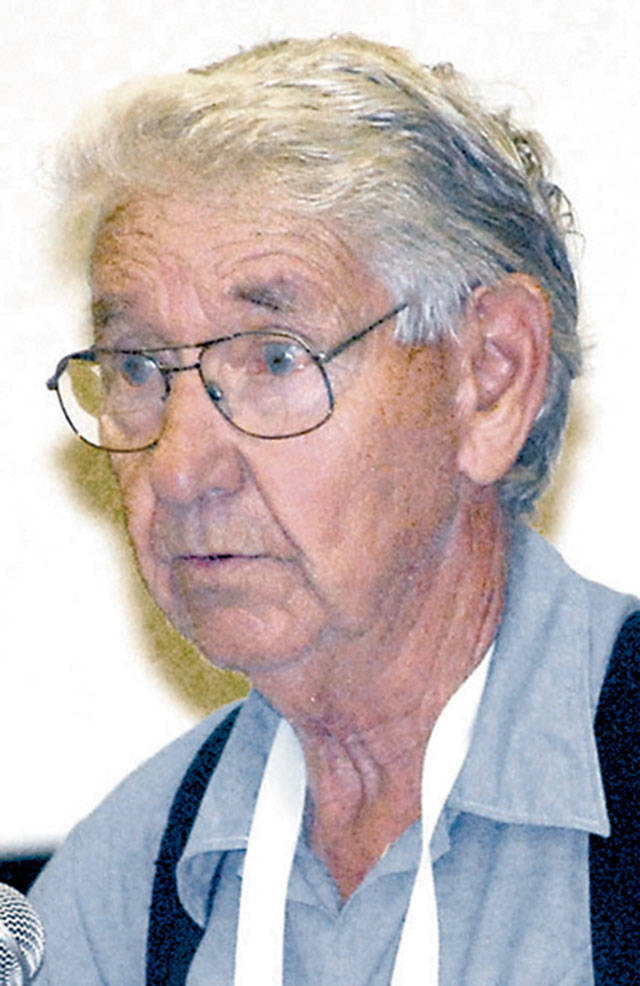PORT ANGELES — “The Memory of Fish,” a portrait of the late Dick Goin, will be screened at two locations at 7 p.m. Friday and will be introduced during Studium Generale at 12:30 p.m. Thursday.
The documentary of the life of Goin — a pulp mill worker and master fisherman who used his memories and persistence to battle for removal of the two dams on the Elwha River to allow salmon access to a wild river — will be shown at the Little Theater and Maier Performance Hall, both on Peninsula College’s Port Angeles campus at 1502 E. Lauridsen Blvd.
Admission will be $5 to the film, sponsored by the Magic of Cinema program.
On Thursday in the Little Theater, filmmaker Jennifer Galvin and Emma Jones, archival researcher and co-producer, will talk about the film that will be shown the next day. Admission is free.
“We are finally bringing this film home,” Jones said. “After playing in festivals all over this country and in England as well, ‘The Memory of Fish’ returns to the Olympic Peninsula for its premiere to local audiences.”
‘Green Oscars’
At the Wild Screen Festival in Bristol, U.K., the film was nominated for a Panda Award, which is also referred to as the “Green Oscars” for documentary films. The film premiered at the Seattle International Film Festival.
Coastal Watershed Institute biologists Caroline Walls and Jamie Michel will be on hand at the screenings of the film to answer questions about the evolving mouth of the Elwha, said Anne Shaffer, executive director of the institute.
“Jennifer’s film is lyrical and beautiful. It’s a welcome moment to just be quiet and breath deep,” Shaffer said.
Goin died at the age of 83 in April 2015, having seen the results of his labors in the demolition of two dams that blocked fish passage on the Elwha River, which now flows freely after the 2011-to-2013 removal of the Elwha and Glines Canyon dams.
Goin’s love story with the Elwha River began in 1937, as a 6-year-old boy running from Iowa with his family in the ’30s.
The Goin family settled on the Peninsula’s coast where they lived primarily on Elwha salmon.
He felt the salmon saved his family and so his life debt to fish grew, said organizers of the screenings.
In the 1950s, Goin began keeping detailed fishing journals, which scientists came to rely on for answers and institutional baseline data.
His notebooks became cherished sources of wisdom for how the river changed over time and how it could be fixed, said those who knew him.
The diaries, which are being preserved by Olympic National Park, represent a “rare chronicle of the Peninsula’s historical conditions and changes over several decades,” said Sam Brenkman, chief fisheries biologist for Olympic National Park, in March 2016 when the North Olympic Land Trust honored him posthumously with its Out Standing in the Field Award.
Goin worked as a machinist at the former Rayonier mill in Port Angeles for 42 years, retiring as a foreman.
He was president of the Olympic Outdoor Sportsmen’s Association, a member of the Western Pulp and Paper Workers, a technical adviser for a governor’s salmon program and was nominated for Washington’s Wild Salmon Hall of Fame.
Goin also was the keynote speaker at the first Elwha River Science Symposium in 2011, which “really kicked off and marked the beginning of the largest dam removal in American history,” Brenkman said last year.
“Dick Goin was an understated, lovely man that we all worked with regularly,” Shaffer said.
“He provided us with some of the only historical information we have on eulachon in the lower river of the Elwha. He is very sorely missed.”
For more information, contact Kate Reavey, who coordinates Studium Generale, at kreavey@pencol.edu.

